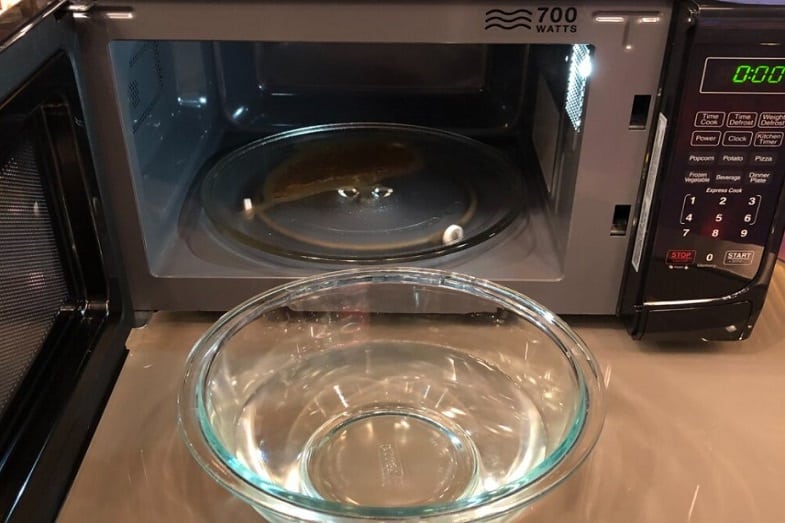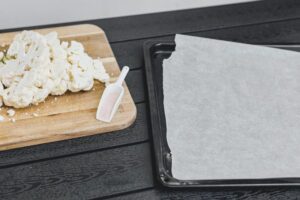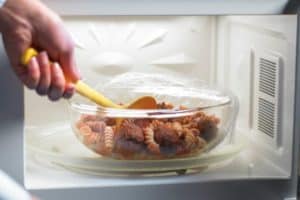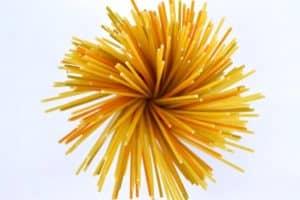How long does it take to boil water in the microwave? The microwave is a very convenient tool for boiling water quickly. But it can be a challenge to know exactly how long it takes for it to boil. In this article, I will describe exactly how long it takes to bring water to a boil in a microwave.
How long to boil water in the microwave? It takes approximately 1 to 3 minutes to boil a cup of water in a standard microwave. A standard microwave has about 700 watts of power.
The time it takes to boil water will be faster or longer depending on the wattage of your microwave. The below table shows how long it takes to boil one cup of water with microwaves of different wattage levels.
| Microwave Power/Watts | Estimated Time |
| 600 watts | 4 minutes |
| 700 watts | 3 minutes |
| 800 watts | 2.5 minutes |
| 1,000 watts | 2 minutes |
| 1,200 watts | 1 minute |
Boiling water in the microwave is really easy, but there are still safety concerns that you must consider.
Read on to learn more about how long it takes to boil water in the microwave, including important tips and safety precautions.
How Long Does It Take to Boil Water in the Microwave?
Boiling water in the microwave is best done when you only need a small amount of water to boil. The microwave’s best advantage is that it can distribute heat evenly. So, it will only take approximately 1-3 minutes to boil about a cup of water for the majority of microwave ovens.
However, it usually depends on a lot of factors. The most significant factor is the power of the microwave that you are using to boil water. A 1,000-watt microwave will boil water faster than a 600-watt unit. Consequently, a 1,800-watt microwave will boil water faster than a 1,000-watt unit and much faster than a 600-watt device.
To determine how long your particular microwave can boil water, set its timer to 3 minutes. Check if the water boils in less than 3 minutes. If it does, you have a microwave oven with a wattage of about 600 to 700 watts.
But if it takes about 3 to 4 minutes, then you have a 500 to 600-watt microwave. For a 1,000-watt microwave running at its maximum power, it will only take a minute to boil 1 cup of water. As you can see, wattage means a lot – if you want to boil water in a short time.
Factors That Determine How Long It Takes to Boil Water in Microwave
To get the exact time you need to boil water in a microwave, you have to consider several factors. Any of the following factors can affect the length of time required to boil water:
- The power or wattage capacity of the microwave oven
- The amount or volume of water in the cup or container you are using (e.g., 1 cup is equivalent to 180 ml; another container could contain 284 ml)
- The material of the cup or container holding the water
- The initial temperature of the water
- The ambient pressure of the place where the water is being boiled (this factor is related to the place’s altitude or level of elevation)
- The efficiency of the microwave oven
- The specific heat of the water
How Long Does It Take Water to Boil With Different Microwave Wattages?

I have already mentioned that you can boil water faster in a microwave oven with a high wattage compared to another unit with a lower wattage.
To help you understand the information better, I have created a table that lists the available microwave models in the market and the estimated time they can boil one (1) cup of water.
| Power/Watts | Estimated Time |
| 600 watts | 4 minutes |
| 700 watts | 3 minutes |
| 800 watts | 2.5 minutes |
| 1,000 watts | 2 minutes |
| 1,200 watts | 1 minute |
You will also know the wattage of your particular microwave oven if you check its user manual. It should have a section there that details its specifications. Now, the efficiency of your microwave will also affect the boiling time.
Typically, fresh-from-the-box devices can operate at their optimum efficiency at 100 percent. It depends now on how many years you have been using your microwave. If you have been using it for four or more years, its efficiency is already way below 100 percent, no matter how you take care of it.
In other words, you should adjust the time. But in any case, boiling water in it should still be shorter and quicker than boiling water using a kettle on a stovetop.
What Containers Are Safe and Not Safe to Boil Water in a Microwave?
You can’t just use any kind of container to boil water in the microwave. If you boil water in containers that are not oven-safe, you are putting yourself at risk. Some homeowners have suffered unforeseen accidents because they didn’t consider this point seriously.
So, what containers are safe for boiling water in a microwave oven? Check out this list:
- Any container that is labeled with “Microwave-safe” or “Oven-safe”
- Glass containers and dishes marked “Microwave-safe” or “Oven-safe”
- Ceramic pans and dishes
- Stoneware pans and dishes
Here is a list of containers that you should not use in the microwave, whether for boiling water or heating food.
- Metal pans and pots
- Ceramics, glass pans, and dishes that contain metal parts
- Sealed containers
- Aluminum foil
- Styrofoam
- Brown paper bags
- Plastic pans and dishes
- Plastic wrap
- Cold storage plastic containers
We’ve answered the question, “How long does it take to boil water in microwave?”; next, let’s look at the safety precautions and risks when boiling water using the microwave oven.
Safety Precautions for Boiling Water in Microwave
The primary risk you face when boiling water in the microwave is that it may reach superheated temperature. It can cause superheated water to explode violently out of the container. Moreover, boiling water in a microwave does not usually produce bubbles. But when it is suddenly disturbed, it may create an explosion because of the lack of nucleation sites.
Also, when water is superheated, its temperature goes way above its boiling point. But if you use the proper container or observed the right safety precautions, it will not explode. To avoid accidents, here are some things you should do:
- Don’t use oven-safe containers, pans, or dishes that have perfectly smooth surfaces. They don’t have nucleation sites where bubbles can form. If the boiling water is disturbed, it may explode, and you will have a mess on your hand.
- Use older oven-safe containers that have some small scratches or little imperfections on their inner surfaces. These imperfections will serve as nucleation sites where bubbles can form.
- Put a wooden stirrer or any oven-safe stick or utensil in the pan or dish. This stick will serve as the nucleation site of the molecules of the boiling water.
- Use hot pads or wear thick kitchen mittens to hold hot pans.
- Don’t touch the water to see if it is already boiling. Boiling water in a microwave usually does not produce bubbles. Don’t be tempted to check if it is boiling by touching it.
- When boiling water in a microwave, do it in intervals. Don’t allow cooking time to go more than 1.5 minutes on every interval. Follow this method to prevent boiling water from reaching superheated temperature as steam begins to form. For each interval, stir the water and continue cooking until the estimated time is up.
How to Safely Boil Water in Microwave
Now, you are ready to learn the safest way of boiling water in a microwave oven. It is very simple, really.
- Get a microwave oven-safe container or bowl. (Check my list above).
- Pour water into the bowl or container. Do not cover or seal the container.
- Get a non-metallic stick or object and put it inside the container. A chopstick or small wooden spoon will suffice. This object will prevent boiling water from superheating.
- Heat the water in short intervals. Stir after every 1.5 minutes until you see it boiling.
- Tap the side of the container or bowl to check if the water is already boiling. This action will disturb the water molecules. It will induce them to release trapped heat.
- Remove the container or bowl after the water has boiled for a reasonable time. Use the right kitchen mitten or hot pads when handling the container.
Moreover, you can simply use a thermometer to check if the water is already boiling. It is the safest and most accurate way. At sea level or ground level, water boils at 212°F (100°C). At higher altitudes, the boiling point of water decreases.
As mentioned earlier, it should take about 1 to 3 minutes to boil a cup of water in most microwaves.

Beware of Superheated Water
So, the question is, “Why do you need to concern yourself with boiling water reaching superheated temperature?” When water gets past its boiling point, it becomes superheated and cannot form bubbles mainly because the container has no nucleation sites. Superheating likely happens when you use oven-safe containers that are fresh from the box.
If this superheated water, with no bubbles, is suddenly disturbed, a nucleation site is introduced. Steam will quickly form out of the superheated water and cause an explosion of boiling water.
It’s the reason why you are advised to put a non-metallic object in the container. This object serves as the nucleation site for the water molecules so that trapped heat will be released intermittently and not suddenly.
Moreover, if you continue boiling the water after it has reached its boiling point, you will sterilize it. Boiling water for a long time will kill harmful microbes lurking in the water. The EPA and the CDC recommend boiling water for at least 1 to 3 minutes at altitudes above 6,562 feet (2,000 meters).
Risks of Boiling Water in Microwave
There is a need to emphasize the danger of water reaching superheated temperatures when boiled in a microwave oven. At superheated temperatures, water becomes unstable. In other words, you face risks whenever you are boiling water in the microwave.
Some scientists at the University of New South Wales have discovered that one liter of water, superheated just by one degree, can produce around three liters of steam.
If you use a one-liter container to boil one liter of water in the microwave, water will explode out of the container when it becomes superheated. There have been reports of such incidents where people got injured.
Usually, water boils at 212°F (100°C) in an average domestic kitchen with bubbles and steam that emit from the kettle. However, the heat inside the microwave oven is generated by microwaves acting directly on the water molecules. Thus, it makes the water hotter than its container.
It is not like the heat generated by heating filaments in an electric stove or the gas in a gas stove. In the traditional way, the container is heated by filament or gas, and the container transfers its heat to the water. Then, the water boils when it reaches its boiling point.
Admittedly, such a process takes much longer than boiling water in a microwave. But there are also risks involved if you do not follow the recommended safety guidelines. Microwave-safe dishes and containers are typically smoother than saucepans and kettles. So, they don’t have nucleation sites.
Air bubbles have no places to cling to, unlike the rougher surfaces of ordinary kettles and pans. Also, boiled water in the microwave does not bubble and becomes unstable. So, when boiling water in a microwave, you really have to be careful and follow the safety guidelines.
Conclusion – How Long Does It Take to Boil Water in the Microwave?
So, to recap, how long does it take to boil water in the microwave? On average, it would take around 1–3 minutes to boil water. But it will depend on the capacity or wattage of the microwave.
To get the exact length of time, you need to know the wattage that your microwave can generate to heat the water to its boiling point.
The below table shows how long it takes to boil a cup of water with microwaves of different wattage levels.
| Microwave Power/Watts | Estimated Time |
| 600 watts | 4 minutes |
| 700 watts | 3 minutes |
| 800 watts | 2.5 minutes |
| 1,000 watts | 2 minutes |
| 1,200 watts | 1 minute |
Read next:


![How Long Does DayQuil Last? [How Long It Stays in Your System] how long does dayquil last](https://howchimp.com/wp-content/uploads/2021/06/how-long-does-dayquil-last-300x200.jpg)
![How Long Does DHL Take to Deliver? [DHL Delivery Time] How Long Does DHL Take to Deliver](https://howchimp.com/wp-content/uploads/2021/05/how-long-does-DHL-take-to-deliver-300x200.jpg)


